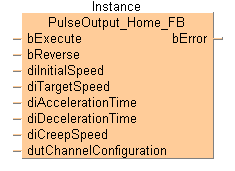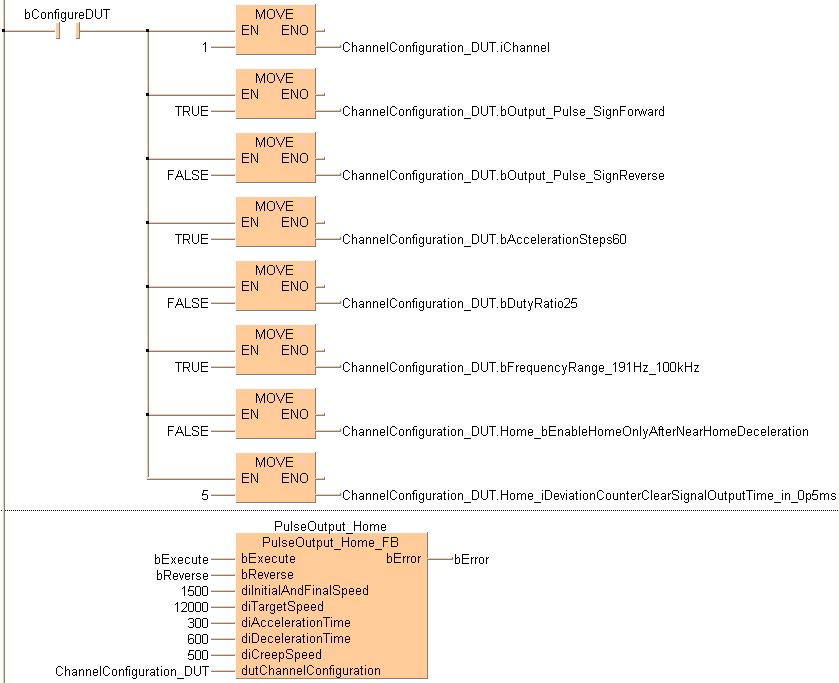


 PulseOutput_Home_FB
PulseOutput_Home_FBHome return
This instruction performs a home return according to the parameters in the function block and in the specified DUT. Pulses are output from the specified channel when the control flag for this channel is FALSE and the execution condition is TRUE.

Input
A rising edge activates the function block
Movement direction: Forward = FALSE, Reverse = TRUE
Initial speed/Target speed: Set this value according to the frequency range selected in PulseOutput_Channel_Configuration_DUT:
FPS, FP-X: 1 to 9800 (1.5Hz–9.8kHz)
48 to 100000 (48Hz–100kHz)
191 to 100000 (191–100kHz)
F171_PulseOutput_Trapezoidal: 1 to 50000 (1Hz–50kHz)
FP0, F168_PulseOutput_Trapezoidal: 40 to 5000 (40Hz–5kHz)
Acceleration/deceleration time (FPS, FP-X):
With 30 steps: 30ms–32760ms (specify in steps of 30)
With 60 steps: 60ms–32760ms (specify in steps of 60)
Acceleration/deceleration time (FP0, F168_PulseOutput_Trapezoidal): 30ms–32760ms
Acceleration time (F171_PulseOutput_Trapezoidal): 1ms–32760ms
Deceleration time (F171_PulseOutput_Trapezoidal): 1ms–32760ms
Creep speed (F171_PulseOutput_Trapezoidal): 1 to 50000 (1Hz–50kHz)
Output
TRUE if an applied input value is invalid. Execution of the function block stops.
This non-inline instruction is part of the tool instructions for pulse output. For a detailed description of the instruction(s) used internally, please refer to:
FPS, FP-X: F171_PulseOutput_Home
FP-e, FP0: F168_PulseOutput_Home
Use PulseInfo_IsActive to check if the control flag for the selected channel is FALSE.Use PulseInfo_IsHomeInputTrue to check if the home input is TRUE.
Avoid malfunctions or an operation error:
Make sure to set the system register to pulse output mode when using a home input.
The home input may not be occupied by other instructions like pulse-catch input, interrupt input or high-speed counter.
With a Data Unit Type (DUT) you can define a data unit type that is composed of other data types. A DUT is first defined in the DUT pool and then processed like the standard data types (BOOL, INT, etc.) in the list of global variables or the POU header.


All input and output variables used for programming this function have been declared in the POU header. The same POU header is used for all programming languages.

VAR
PulseOutput_Home: PulseOutput_Home_FB;
bExecute: BOOL:=FALSE;
bReverse: BOOL:=FALSE;
bError: BOOL:=FALSE;
ChannelConfiguration_DUT: PulseOutput_Channel_Configuration_DUT;
bConfigureDUT: BOOL:=FALSE;
END_VAR

BODY
WORKSPACE
NETWORK_LIST_TYPE := NWTYPELD ;
ACTIVE_NETWORK := 0 ;
END_WORKSPACE
NET_WORK
NETWORK_TYPE := NWTYPELD ;
NETWORK_LABEL := ;
NETWORK_TITLE := ;
NETWORK_HEIGHT := 32 ;
NETWORK_BODY
B(B_CONTACT,,bConfigureDUT,4,1,6,3,);
B(B_F,E_MOVE!,,15,0,21,4,,?DEN?D?AENO?C);
B(B_VARIN,,1,13,2,15,4,);
B(B_F,E_MOVE!,,15,8,21,12,,?DEN?D?AENO?C);
B(B_VARIN,,FALSE,13,10,15,12,);
B(B_VAROUT,,ChannelConfiguration_DUT.bOutput_Pulse_SignReverse,21,10,23,12,);
B(B_F,E_MOVE!,,15,12,21,16,,?DEN?D?AENO?C);
B(B_F,E_MOVE!,,15,4,21,8,,?DEN?D?AENO?C);
B(B_VARIN,,TRUE,13,6,15,8,);
B(B_VAROUT,,ChannelConfiguration_DUT.bOutput_Pulse_SignForward,21,6,23,8,);
B(B_VARIN,,TRUE,13,14,15,16,);
B(B_VAROUT,,ChannelConfiguration_DUT.iChannel,21,2,23,4,);
B(B_F,E_MOVE!,,15,16,21,20,,?DEN?D?AENO?C);
B(B_VARIN,,FALSE,13,18,15,20,);
B(B_VAROUT,,ChannelConfiguration_DUT.bDutyRatio25,21,18,23,20,);
B(B_F,E_MOVE!,,15,20,21,24,,?DEN?D?AENO?C);
B(B_VAROUT,,ChannelConfiguration_DUT.bAccelerationSteps60,21,14,23,16,);
B(B_VAROUT,,ChannelConfiguration_DUT.bFrequencyRange_191Hz_100kHz,21,22,23,24,);
B(B_VARIN,,TRUE,13,22,15,24,);
B(B_F,E_MOVE!,,15,24,21,28,,?DEN?D?AENO?C);
B(B_VARIN,,FALSE,13,26,15,28,);
B(B_VAROUT,,ChannelConfiguration_DUT.Home_bEnableHomeOnlyAfterNearHomeDeceleration,21,26,23,28,);
B(B_F,E_MOVE!,,15,28,21,32,,?DEN?D?AENO?C);
B(B_VAROUT,,ChannelConfiguration_DUT.Home_iDeviationCounterClearSignalOutputTime_in_0p5ms,21,30,23,32,);
B(B_VARIN,,5,13,30,15,32,);
L(10,2,10,6);
L(10,10,10,14);
L(10,6,10,10);
L(10,14,10,18);
L(10,18,10,22);
L(10,22,10,26);
L(6,2,10,2);
L(1,2,4,2);
L(10,26,10,30);
L(10,30,15,30);
L(10,26,15,26);
L(10,22,15,22);
L(10,18,15,18);
L(10,6,15,6);
L(10,14,15,14);
L(10,10,15,10);
L(10,2,15,2);
L(1,0,1,32);
END_NETWORK_BODY
END_NET_WORK
NET_WORK
NETWORK_TYPE := NWTYPELD ;
NETWORK_LABEL := ;
NETWORK_TITLE := ;
NETWORK_HEIGHT := 11 ;
NETWORK_BODY
B(B_FB,PulseOutput_Home_FB!,PulseOutput_Home,15,1,28,11,,?BbExecute?BbReverse?BdiInitialAndFinalSpeed?BdiTargetSpeed?BdiAccelerationTime?BdiDecelerationTime?BdiCreepSpeed?BdutChannelConfiguration?AbError);
B(B_VARIN,,bExecute,13,2,15,4,);
B(B_VARIN,,bReverse,13,3,15,5,);
B(B_VARIN,,1500,13,4,15,6,);
B(B_VARIN,,12000,13,5,15,7,);
B(B_VARIN,,300,13,6,15,8,);
B(B_VARIN,,600,13,7,15,9,);
B(B_VARIN,,500,13,8,15,10,);
B(B_VARIN,,ChannelConfiguration_DUT,13,9,15,11,);
B(B_VAROUT,,bError,28,2,30,4,);
L(1,0,1,11);
END_NETWORK_BODY
END_NET_WORK
END_BODY
(* Used DUT parameters *)
ChannelConfiguration_DUT.iChannel := 1;
ChannelConfiguration_DUT.bOutput_Pulse_ForwardTrue := TRUE;
ChannelConfiguration_DUT.bOutput_Pulse_ForwardFalse := FALSE;
ChannelConfiguration_DUT.bAccelerationSteps60 := FALSE;
ChannelConfiguration_DUT.bDutyRatio25 := TRUE;
ChannelConfiguration_DUT.bFrequencyRange_191Hz_100kHz := TRUE;
ChannelConfiguration_DUT.Home_bEnableHomeOnlyAfterNearHomeDeceleration := FALSE;
ChannelConfiguration_DUT.Home_iDeviationCounterClearSignalOutputTime_in_0p5ms := 5;
ChannelConfiguration_DUT.bExecuteInInterrupt := FALSE;
(* FB *)
PulseOutput_Home(bExecute := bExecute,
bReverse := bReverse,
diInitialAndFinalSpeed := 1500,
diTargetSpeed := 12000,
diAccelerationTime := 300,
diDecelerationTime := 600,
diCreepSpeed := 500,
dutChannelConfiguration := ChannelConfiguration_DUT,
bError => bError);